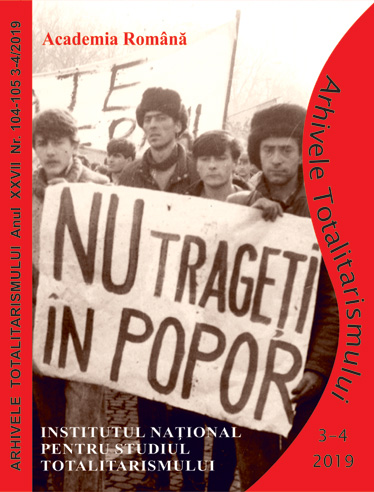The Totalitarian Origin of an Anti-Totalitarian Narrative Past and Present Accounts on Communism in Romania
The Totalitarian Origin of an Anti-Totalitarian Narrative Past and Present Accounts on Communism in Romania
Author(s): Cristina PetrescuSubject(s): History, Political history, Recent History (1900 till today), Special Historiographies:, Post-War period (1950 - 1989), History of Communism, Cold-War History
Published by: Institutul National pentru Studiul Totalitarismului
Keywords: totalitarianism; terror; secret police; historiography; memory;
Summary/Abstract: This paper traces the origin of the post-communist historical accounts tackling the 1945–1968 period, which almost unanimously interpret this past as a clash between those in power and those who considered this power illegitimate. According to it, in communist Romania, there were only a handful of perpetrators from the secret police and a large majority of innocent victims, who tried to resist their reign of terror and repression. This paper argues that this mainstream interpretation emerged – paradoxically enough – from the post-1968 official accounts of the 1945–1968 period. It was Nicolae Ceaușescu’s belated de-Stalinization and his public condemnation of the crimes committed by the Securitate that generated an enduring discourse, which essentialized the role of the secret police in submitting the Romanian society to the communist rule, while by default absolving anyone else of responsibility. Ceaușescu’s indictment of the secret police, however, was built upon previous inquiries upon abuses committed against political prisoners, which – interestingly enough—his predecessor, Gheorghe Gheorghiu-Dej, ordered after Stalin’s death but never made public. These inquiries came out of the archives of the former secret police only after 1989 and their opening constituted a “revelation” for a new generation of professionals who lacked the personal experience of 1968, and turned such communist-produced documents into uncritically used sources for accounting terror and repression. The irony is that secret police documents suggest the communist regime maintained its power rather by attracting the collaboration of individuals who tried to integrate themselves into the new society. Such accounts that read differently the secret police documents and illustrate the multiplicity of responses to the communist dictatorship, which ranged from compliance to defiance, are yet very rare in the Romanian post-1989 historiography
Journal: Arhivele Totalitarismului
- Issue Year: XXVII/2019
- Issue No: 3-4
- Page Range: 252-271
- Page Count: 20
- Language: English
- Content File-PDF

